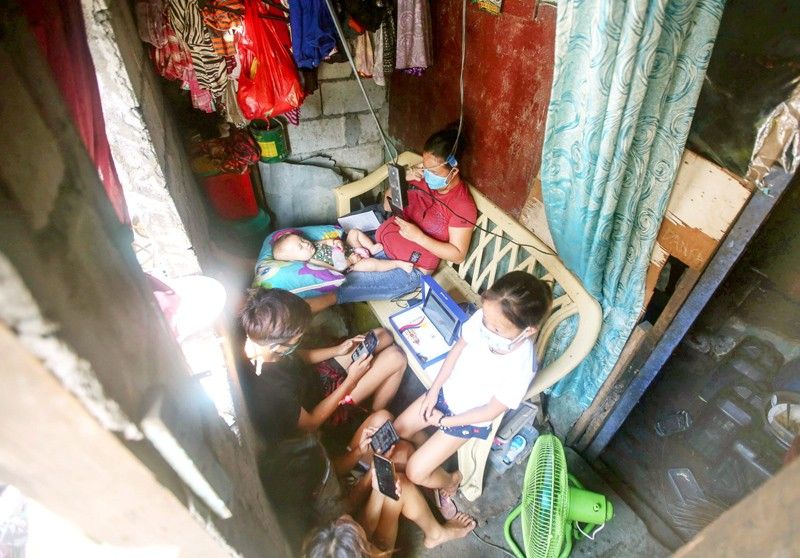PNP seeks barangay noise ban during online classes

MANILA, Philippines — Barangays nationwide will be asked to pass local ordinances or resolutions banning activities that create unnecessary noise that could disrupt the online distance learning of millions of public school students who resumed classes yesterday.
Philippine National Police (PNP) chief Gen. Camilo Cascolan said police were directed to coordinate with barangay officials to make communities conducive to distance learning and work from home arrangements while the threat of the coronavirus pandemic remains.
“We will be asking the barangays to have a resolution regarding the use of these noisy equipment. Barangay ordinances will be in place and we will coordinate with them,” Cascolan told reporters yesterday.
To strengthen the enforcement of the measure, Cascolan said the PNP would also set up barangay assistance centers where at least two policemen would be assigned.
“Everything will be coordinated with police stations. Should there be big problems, they can make a call there. They will have direct contact with operational units in the area,” Cascolan added.
Last Sunday, police commanders nationwide were ordered to launch a crackdown on persons drinking and singing karaoke in public spaces ahead of the resumption of classes in public schools.
Meanwhile, the PNP also clarified that it would not be banning students who have no access to learning gadgets and to the internet from entering computer shops.
This clarification came as the Joint Task Force COVID Shield earlier said minors should not be allowed in internet cafes as part of quarantine rules and for their protection from the virus.
Cascolan said what the task force meant was protocols should be followed inside internet cafes and urged schools to coordinate with computer shops if there are students experiencing difficulties with the current blended learning setup.
“It’s only prohibited if you are not there to use the internet,” he said.
Millions of students in public elementary and high schools across the country started distance learning at home yesterday as classes resumed.
Private schools, meanwhile, were earlier allowed by the Department of Education (DepEd) to start their classes ahead of public schools.
Classes were supposed to begin last Aug. 24, but several lawmakers and groups urged the DepEd to defer the start of classes in order to better prepare for the transition to blended learning.
Because it may do more harm than good, the government is not yet open to the idea of allowing internet shops to reopen and give students a place to attend their online classes.
Defense Secretary Delfin Lorenzana, who chairs the National Task Force Against COVID-19, said computer shops would remain closed for now.
Lorenzana said internet shops are enclosed places where customers assemble and increase the risk of coronavirus transmission.
Metro Manila and some parts of the country remain under general community quarantine, but most are under modified GCQ for the month of October.
Online scams
Valenzuela City Rep. Wes Gatchalian called on the government to impose a law regulating internet transactions that would curb online scams and other fraudulent and deceptive practices.
“We really need stricter rules to hold both e-commerce platforms and courier services accountable for damaged or lost goods purchased online,” said Gatchalian, chairman of the House trade and industry committee.
He authored House Bill 6122 (Internet Transactions Act), which specifies obligations and liabilities for e-commerce platforms and online merchants, including the delivery of goods to consumers in the condition as required by the sales contract.
The bill seeks to establish a code of conduct for online businesses, including allowing for the tracking of deliveries by online merchants and providing complete records of the goods purchased and having them delivered within the promised time and described condition.
Quezon City Rep. Alfred Vargas expressed dismay over the very poor quality of internet connection in several parts of the country.
“Telcos used to complain there has been a lot of red tape in government like securing permits. Now that these requirements have been suspended, telcos should expedite the construction of more cell towers, especially in those areas where internet is slow,” he said.
Vargas said the Department of the Interior and Local Government (DILG)’s Joint Memorandum Circular 1, Series of 2020, which streamlines the documentary requirements and processing time for building permit applications of common cell towers, will also help telcos double or triple the number of cell sites nationwide.
Vargas, vice chairman of the House committee on public information, also urged the DILG to closely monitor the compliance of local government units (LGUs) with the joint memorandum circular to ensure telcos can fast-track the construction of more cell towers.
As of Sept. 21, the Anti-Red Tape Authority reported a total of 933 approved telco permits following the issuance of Compliance Orders to LGUs to the memorandum circular since August. — Delon Porcalla, Michael Punongbayan
- Latest
- Trending





























